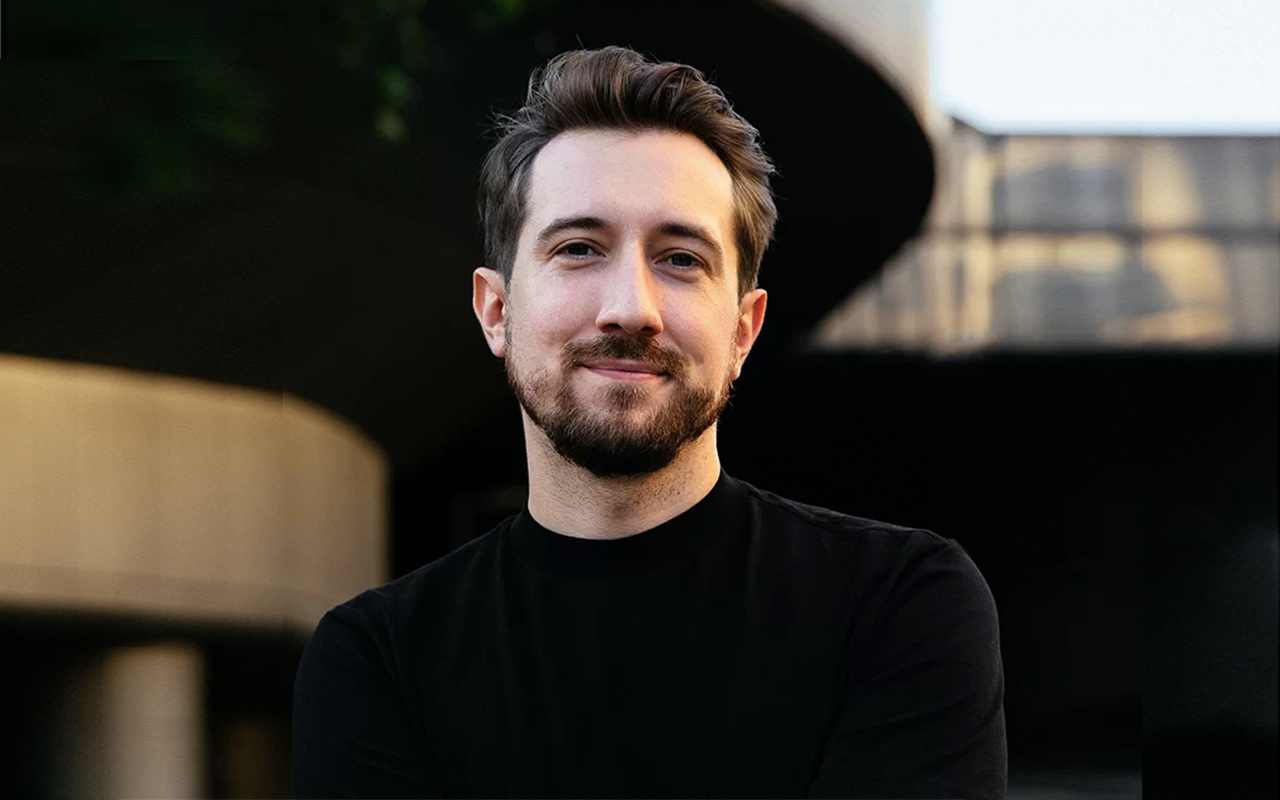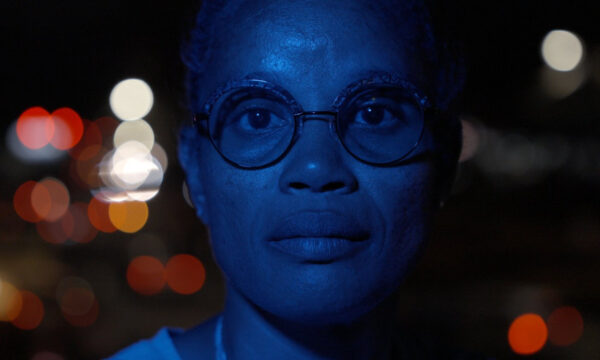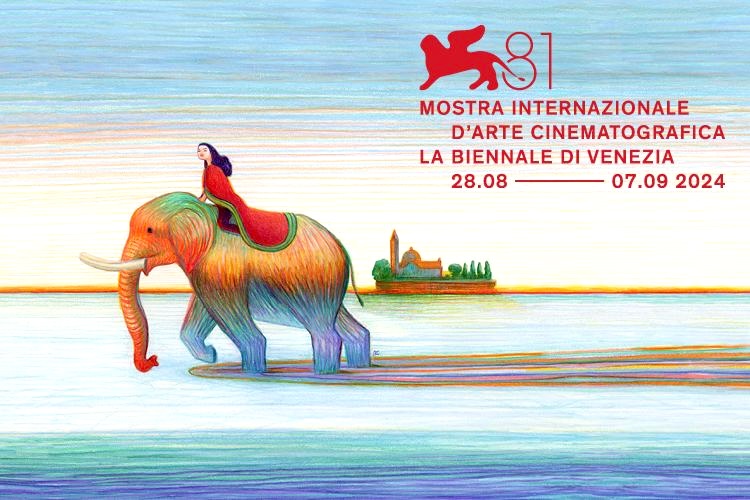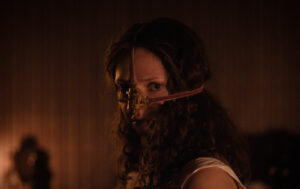“For me, life is just more beautiful with humour”: Bernhard Wenger on Peacock at Venice Film Festival 2024

The International Critics Week is a parallel section of the Venice Film Festival dedicated to showcasing the new generation of filmmakers. One of the standout titles this year was Bernhard Wenger’s feature debut Peacock, which won the Premio Bisato d’Oro. In it, Matthias (played by one of Germany’s most sought-after leading men, Albrecht Schuch) has somehow lost his sense of self climbing the career ladder of a rent-a-friend agency in Vienna and transforming himself into whatever clients hire him to be.
We spoke to the Austrian director about the refreshing humour with which he tackled a rather sad story, and the difficult development of a character that lacks character. Further, Wenger shared the inspiration he took from Scandinavian cinema and the role social media played as a metaphor.
What is the story behind Peacock?
Well, it’s a film about identity, a film circling the questions: “What is real? Are we real?” All that is built around the phenomenon of rent-a-friend agencies. These agencies have existed in Japan for more than two decades already, and they were invented to help people who really don’t have anybody in their lives to go for a coffee, or to have someone just to talk to, to have a walk together…The big problems in Japan are isolation and loneliness. That’s why they were founded. But like it is with good intentions, these agencies quickly were used for different things: for better self-presentation, to manipulate people, to hide lies, to demonstrate power. And unfortunately, these reasons are also why these agencies would work in nearly every society.
When I spoke to Albrecht earlier, he said he particularly loved the Austrian humour in the script. Is this something you can put your finger on?
Yeah, in Austria we do have a, I’d say, dark sense of humour. There is also, especially in Vienna, a bit of a grumpiness. People tend to be grumpy about every tiny thing and complain, and around that snark is this dark humour. Nevertheless, in Austrian films, we don’t see that much humour. I guess when you think of Austrian films internationally, you think of dark films and very serious films, but yeah, the humour is there in Austria, and I love to work with it, because for me, life is just more beautiful with humour.
Of course, we don’t want to spoil the ending of the film, but it is quite memorable. How did you arrive at this point?
Well, what I can say about it is that self-presentation is very much an upper-class topic. I’d say it has always been, because, if we look back at a long time ago, when monarchy existed, already they built big castles, and they had gold to make their lives more shiny. They wore wigs and corsets to look perfect. So self-presentation was always upper class, because, you know, if starvation, hunger, money, are not problems you face in your life, your problems are, how do you look to the outside? With social media nowadays, self-presentation has gotten so much easier because everybody or nearly everybody can use social media and present themselves in the best manner. Rent-a-friend agencies are actually the same thing but in real life. It’s just that it’s not online anymore, but you rent somebody to present yourself in a better light.
Matthias’s actions seem inspired by the performance art he saw earlier. Is this based on something real?
Yes, I once saw a documentary about a Japanese artist who was boxing his paintings, and that’s something I found interesting. When building the story, I thought it would be interesting to have an art form that’s very brutal, that’s very physical. Because Matthias is just sitting in the audience and inside he’s imploding. All the things that happen to him throughout the film influence him, of course, and while watching such a physical art show and hearing beautiful music at the same time, this is something that affects his emotions.
And speaking somewhat to this last scene but also the general tone of your film, similarities are already being drawn to the cinema of Ruben Östlund. Were his films a deliberate inspiration for you?
I mean, I have absolutely been inspired by Scandinavian film. When I grew up, in my teenage years, I discovered Scandinavian film through Kaurismäki. It’s been a huge inspiration for me back then. British black comedy as well, and together with my very Austrian sense for tragedy, this handwriting came together. Of course, I could name many names now, many filmmakers that have been an inspiration to me. But what all of them have in common is that they also work with the genre of satire, and that’s what I love to do too. I think with this genre, you can hold a mirror to society, and we can talk about the big problems we are facing in our society, in European society, or even worldwide. Through humour – if you get entertained while watching a film, and if you laugh and then realise, “Oh, wait, I’m laughing about myself!” I think that is something. This is a way to talk about big topics and make people think about them.
On the other side of this constant need for comparison, how do you stay true to yourself as a young director? Was that a question you asked yourself while you were making the film?
Well in filmmaking, it is hard to do anything that has never been done before, in art in general, I would say. So finding a topic that has not been talked about that much in films: the rent-a-friend [market], that was already a big success. I was really happy when I discovered that, because I thought, “Oh, that’s something you don’t have 100 films about!” Then, of course, there is always style, there is always comparison. I think that it’s totally okay, because as a first-time filmmaker, the audience doesn’t know who I am. If you do not compare it to something, they would probably not know what to expect. And of course, getting inspired by other filmmakers is also something that’s completely natural. I mean, for example, I love to work with visual humour. If we look at comedy right now, humour is mostly happening through dialogue, but if you look back at Jacques Tati, for example, visual humour was something so wonderful to look at! That’s what I love to do as well. Visual humour happens through mise-en-scène, art design, costumes, editing, and that’s something I find very interesting, to have, all these different layers.
How did you approach writing this complex character without, for instance, accidentally describing a robot? How did you make sure that there was still humanity in this person without a self?
Of course having this this very odd, laconic and even very passive main character was a big challenge. That’s something we are not used to seeing in films. We always see the classic hero. But the funny thing was, that this character is a hero through his assignments. He always plays the hero role, but when he loses touch with being himself, he is the exact opposite of a hero. I think that the character really came together from the paper to screen by casting Albrecht, because it was very important that if you have a passive main character, that people really want to follow him and like him. That was the big challenge, of course. And with Albrecht’s previous films, I always loved to watch him. I always loved to follow him, whatever role he played before. He always fascinated me. That’s a huge quality that was needed for the main actor for the film. And yeah, I guess we worked a lot together on very small tones like, “How does Matthias look when he’s lost? Does this look mean being lost? Does this look mean ‘not understanding what’s going to happen next’?” So there are these very small, small details in the preparation.
How did you manage to cast Albrecht Schuch?
He read the script and saw my short films, and then we met and talked about the project. I guess we both have a love for humour in arthouse film, and that’s that’s something we talked a lot about when we talked about the script. What fascinated me was that he’s got a very profound knowledge of screenplays. So we did not just talk about the character and the character arc and scenes, we discussed every little detail. I remember, for example, once Albrecht texted me, “Is Matthias somebody who has facial hair?” So he was thinking about everything.
I really appreciate that not every question was answered in the film, there was still mystery left. Was it like that for you as well, or do you have all the answers?
No actually, I don’t. I think questions and films are to be left open. I mean, it always depends. For example, when the question arises “Is Ina real?,” in one scene, while being on set, I was talking to Theresa and said, “Okay, let’s say, you’re real”, and in another scene, “No, you’re not. You’re rented.” So that, of course, made a difference during directing. But the question is not answered for myself or in the film. And other questions aren’t as well, because I think it is good to not give every answer away, but the audience themselves should find their answers for it.
So what would you say is the main takeaway from your film?
Well, it is about reality. It is about identity and loneliness and self-presentation. I mean, through the topic of rent-a-friend agencies, you could either make a film completely about isolation and loneliness. It could be a very sad dramatic film. This would be very Austrian, actually. But I found the topic of self-presentation interesting, and I chose this for the film, because if we have a look at social media, for example, everybody’s presenting themselves in the best manner. You’re not allowed to fail. You kind of have to be perfect all the time. And that’s a big absurdity of our time, I think. That’s why I wanted to talk about this. I mean, we are all playing roles in our everyday lives, but I think there has to be a real self in the core. Of course, being different as a romantic partner than when you meet someone business-wise, is completely natural. But it doesn’t mean that it changes your identity. It just means you behave differently. Being true to yourself and honest is something I value.
Selina Sondermann
Photo: Hannah Schwaiger
Read more reviews from our Venice Film Festival coverage here.
For further information about the event visit the Venice Film Festival website here.


























Facebook
Twitter
Instagram
YouTube
RSS